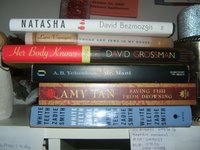I am posting this personal narrative written by a good friend of mine just last week. It's long, but regardless of your political sensibilities, it's worth the read.
As most of you know, Colin Powell came to speak at Purdue this past Thursday. After propagating the administration’s lies for war in the infamous theatre of the UN, and after having excused himself from the subsequent theatre of war, Powell is now making the big bucks on the lecture circuit, making his way finally to the Loeb Theatre at Purdue. I have never taken Powell’s resignation as any kind of repentance for his deep culpability in manufacturing this war; this is evinced by his refusal to come out against the drive to war in an unqualified manner. AB and I (names have been changed to protect the innocent) decided to make our own little protest; so we bought poster board and four-dollar markers to make signs: “Colin Powell: Live Your Life as a Redemption”; “Colin Powell: Live Your Lies in Redemption”; and some death-count figures as well on US soldiers and innocent Iraqis. Later, the cops would take our four-dollar markers, and we would never see them again. As an assembly of two, AB and I headed to the Stewart Center to talk with people. It is important to note that when we arrived, we walked up and down the line holding our signs over our heads and talking with individuals and groups.
AB and I already decided that this would be a pedagogical confrontation—we would ask why people were attending, what they thought of Colin and Dick, and whether they supported the war or not. Additionally, I was begging for an extra ticket so I could go inside to hear more of Powell’s cute little self-deprecating lies. It wasn’t long until a small group of local anarchists showed up and some others willing to protest Powell. As AB will tell you, since he and I were already in the middle of things, I ended up serving as the de facto protest leader, so the cops were especially watchful of me. I walked up and down the line of folks who were waiting to enter the theatre—sometimes shouting diatribes against Powell’s “honored guest” status in our corner of the military-industrial-educational complex, sometimes talking with groups of people about Powell’s lack of repentance for his lies—while AB continued chatting with folks in his honest-talkin' ways and hunting for any extra tickets. The cops “warned” us consistently of where we were allowed to stand. After almost 45 minutes of this, AB yelled from the front of the line that he had a ticket for me. That’s when I started to get nervous—you know, like someone called my bluff.
When I walked up to the entrance with my ticket and my smile, the cops started to freak out, yelling at each other: “He’s the one with the sign! Here’s the one! He’s the one!” They scrambled into “position” and put me up against the wall and thoroughly—I mean thoroughly—searched me: It felt more like a molestation than a search, since the cop twice grabbed my genitals and kept running his hand down my ass in an attempt to humiliate and intimidate me. The cop doing the search warned me that I would be “removed” if I caused a commotion.When I got inside, I had to sit in the balcony; there were two cops on one side of my row, just staring at me, and two cops on the other side of the row. I looked back and saw a secret service agent at the balcony door. Even more nervous than before, I decided to keep a low profile and determine my course of action based on events as they occurred. [University President] Jischke was introduced to introduce Powell, and in his opening remarks, Jischke delivered the most egregiously cruel irony: He invoked Eisenhower as a comparison to Powell! As if Eisenhower never gave his farewell speech warning against the military-industrial complex! As if Purdue is not deeply embedded in the massive war machine that drives us toward perpetual war!
So Powell was finally introduced, and finally he came out. However, he said something very very odd: He looked out over the sold-out theatre and commented on how many people were in attendance, and then he said (for whatever reason), “This reminds me a lot of Vietnam.” While I had no idea what he really intended by this comment out of context, I decided to read the comment as if suggesting that Iraq is much like Vietnam. And so I started clapping… real loud. But despite my attempt to get others clapping with me, it turned out that I was the only one in the entire auditorium clapping. One person turned to me and said, “Why don’t you shut the fuck up!” And another said, “This is not the time!”As it turns out, though, if you clap when EVERYONE ELSE is clapping, there is nothing wrong with that. If you clap by yourself, they read that as a subversive political gesture. When Powell said, within a couple of minutes after the Vietnam remark, that he should be home with his wife, again I clapped. And again, I was the only one to clap. That’s when the pigs (ur, cops) grabbed me and dragged me out of the theatre! One on each side of me, and I wasn’t even resisting! But they dug their meaty little hands into my arms and starting tugging me and pulling me—my guess is that they were like puppet masters trying to make me look like I was resisting. When we got outside the theatre, other protesters starting singing nice solidarity songs for me, and I thought I was going to be arrested—luckily, though, they just took my license number, name, and my ticket! Fargin’ barstiges!
So we stayed and continued protesting, and I was leading everyone in my favorite chant: “Show me what democracy looks like! This is what democracy looks like” (it’s important for people hear this reminder). When we concluded that particular chant, I started into a little Cherokee Pow-Wow dance my grandpa taught me long ago when he took us to pow-wow in the San Joaquin Valley. That was enough for the cops, because they all lined up and marched toward us commanding us to leave the building, saying I had finally become disruptive (you know, as if there isn’t something far more disruptive going on with the whole damn war). As we were backed against the glass doors, we resumed the chant of “Show me what democracy looks like”—but this time, ironically.
[My wife] laughed, later on that night, pointing out that it wasn’t signs, the shouting, the political commentary, the banners, or any of that which got us kicked out by the cops. It was simply the clapping and the dancing. Colin Powell moves from the theatre of war to the theatre at Purdue, and I’m the one hassled for clapping. I guess they don’t like the theatre of their politics to be disrupted by our political theatre. CLAPPING AND DANCING… subversive gestures: political theatre against their theatre of politics. The next day, of course, there was zero media coverage of the protest; in fact, the Purdue Exponent ran a fawning tribute to Powell, with its headline reading, “Four Star Charm.” Meanwhile, as our metonymical theatres fold across each other like so many palimpsestic performances infinitely deferring any real responsibility, the REAL OF WAR continues to rage on, killing hundreds a day and driving millions into deeper poverty.
http://news.yahoo.com/s/afp/20070225/ts_alt_afp/useconomypovertyIt’s not us who should be arrested for “DISRUPTING THE PEACE.”



















